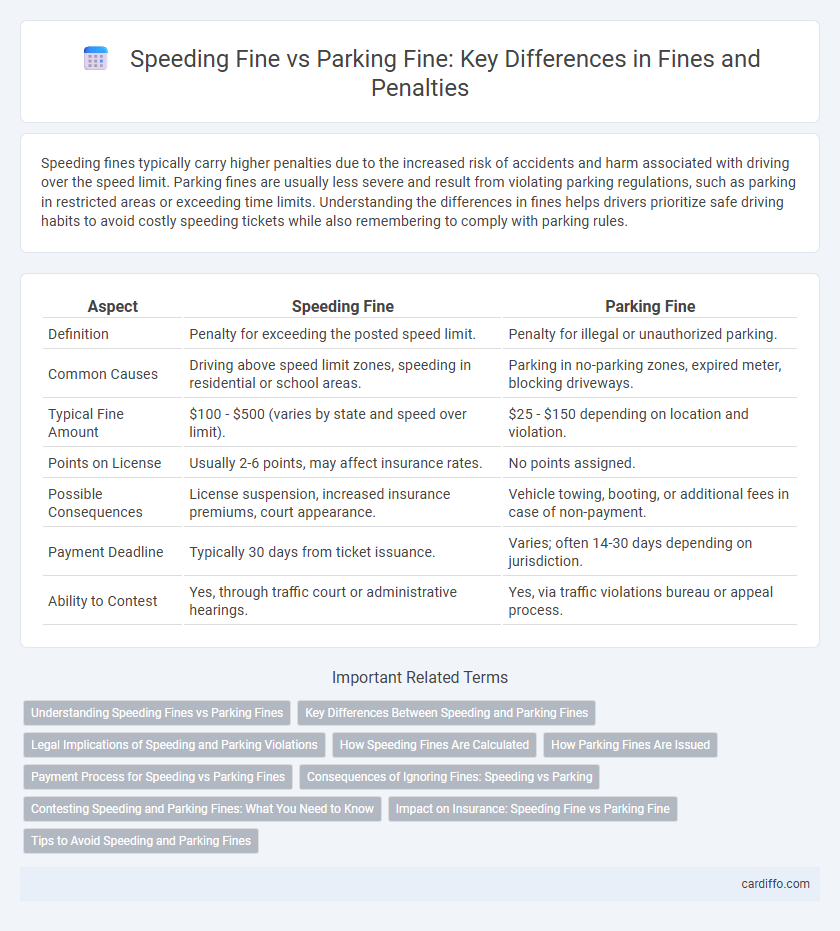Speeding fines typically carry higher penalties due to the increased risk of accidents and harm associated with driving over the speed limit. Parking fines are usually less severe and result from violating parking regulations, such as parking in restricted areas or exceeding time limits. Understanding the differences in fines helps drivers prioritize safe driving habits to avoid costly speeding tickets while also remembering to comply with parking rules.
Table of Comparison
| Aspect | Speeding Fine | Parking Fine |
|---|---|---|
| Definition | Penalty for exceeding the posted speed limit. | Penalty for illegal or unauthorized parking. |
| Common Causes | Driving above speed limit zones, speeding in residential or school areas. | Parking in no-parking zones, expired meter, blocking driveways. |
| Typical Fine Amount | $100 - $500 (varies by state and speed over limit). | $25 - $150 depending on location and violation. |
| Points on License | Usually 2-6 points, may affect insurance rates. | No points assigned. |
| Possible Consequences | License suspension, increased insurance premiums, court appearance. | Vehicle towing, booting, or additional fees in case of non-payment. |
| Payment Deadline | Typically 30 days from ticket issuance. | Varies; often 14-30 days depending on jurisdiction. |
| Ability to Contest | Yes, through traffic court or administrative hearings. | Yes, via traffic violations bureau or appeal process. |
Understanding Speeding Fines vs Parking Fines
Speeding fines typically carry higher monetary penalties and points on your driving license compared to parking fines, reflecting the greater risk to road safety. Parking fines usually result from violations such as expired meters or parking in restricted zones and rarely affect your driving record. Understanding the difference helps drivers prioritize compliance and avoid severe consequences related to speeding violations.
Key Differences Between Speeding and Parking Fines
Speeding fines are penalties imposed for exceeding posted speed limits, directly affecting traffic safety and often resulting in higher monetary charges and points on the driver's license. Parking fines are typically issued for illegal or improper parking, usually carrying lower fines without adding points to the driver's record. Key differences include the nature of the violation, impact on driving privileges, and potential long-term effects on insurance rates.
Legal Implications of Speeding and Parking Violations
Speeding fines carry more severe legal implications than parking fines, often including points on the driver's license and potential increases in insurance premiums. Parking violations typically result in monetary penalties without affecting the driving record or license status. Legal consequences for speeding can escalate to court appearances, license suspension, or even criminal charges in cases of excessive speed or repeat offenses.
How Speeding Fines Are Calculated
Speeding fines are calculated based on the severity of the speed violation, often determined by how many miles per hour the driver exceeds the posted speed limit. Many jurisdictions use a tiered system where fines increase progressively with the speed above the limit, sometimes supplemented by additional fees for repeat offenses. Data from traffic enforcement agencies reveal that speeding fines frequently reflect not just the excess speed but also factors like location, road conditions, and time of day.
How Parking Fines Are Issued
Parking fines are issued based on specific violations such as exceeding time limits or parking in restricted zones, monitored by parking enforcement officers or automatic cameras. These fines are calculated according to local municipal codes, typically involving fixed rates for each type of parking infringement. Unlike speeding fines, parking penalties usually do not require proof of speed but rely on violation of signage or meter regulations.
Payment Process for Speeding vs Parking Fines
Payment process for speeding fines typically involves online portals, mail-in options, or in-person payments at designated traffic offices, often requiring prompt action to avoid additional penalties. Parking fines are usually settled via mobile apps, ticket kiosks, or online platforms, offering more flexible payment windows and immediate resolution upon payment. Both types of fines necessitate providing citation details; however, speeding fines often include options for contesting or attending traffic school before final payment.
Consequences of Ignoring Fines: Speeding vs Parking
Ignoring speeding fines often results in more severe consequences such as increased penalties, license suspension, and potential court appearances. Parking fines, while typically less severe, can accumulate and lead to vehicle immobilization, towing, or additional late fees. Both types of unpaid fines negatively impact credit scores and legal records, emphasizing the importance of timely payment.
Contesting Speeding and Parking Fines: What You Need to Know
Contesting speeding fines often requires providing evidence such as speedometer calibrations or witness statements to challenge the accuracy of speed detection devices, whereas parking fines can typically be disputed by proving valid permits or unclear signage. Understanding local traffic laws and filing appeals within specified deadlines is crucial for both types of fines to avoid additional penalties or increased costs. Utilizing professional legal advice or dedicated traffic fine services can significantly improve the chances of successfully contesting either speeding or parking penalties.
Impact on Insurance: Speeding Fine vs Parking Fine
Speeding fines typically have a greater impact on insurance premiums than parking fines because they indicate risky driving behavior that insurers consider when assessing risk. Parking fines rarely affect insurance rates since they do not reflect driver conduct on the road. Insurers increase premiums after speeding violations to offset potential claims related to accident likelihood.
Tips to Avoid Speeding and Parking Fines
To avoid speeding fines, use cruise control on highways and stay within posted speed limits by frequently checking your speedometer. Parking fines can be prevented by always reading parking signs carefully and choosing legal, well-marked parking spaces even if it means walking a little further. Utilizing parking apps for real-time space availability reduces the risk of illegal parking and subsequent fines.
Speeding fine vs parking fine Infographic

 cardiffo.com
cardiffo.com